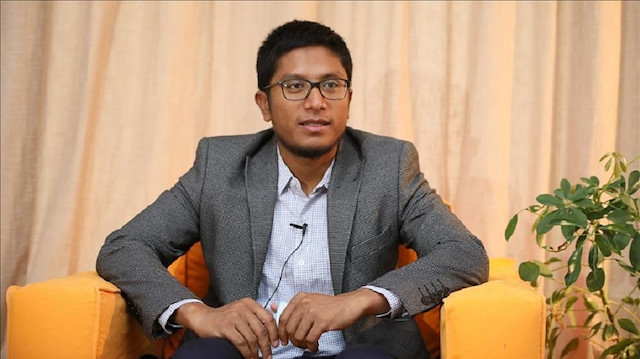
Myanmar faces lawsuit at ICJ filed by West African country Gambia, first hearing to take place on Dec. 10
Rohingya Muslims in Europe are hopeful for the outcome of a lawsuit at the International Court of Justice (ICJ) filed against Myanmar by West African country Gambia for atrocities against Rohingya Muslims in the country over the past few years.
"December 10 will be historic day for Rohingya. This is the beginning of justice and accountability for decades-long genocidal sufferings of Rohingya," Hla Kyaw, chairman of the European Rohingya Council, told Anadolu Agency.
"We have been waiting for justice for too long," he added, expressing hope that the "ICJ process goes quick and brings justice to Rohingya people as quickly as possible."
He also called for international community to create a "safe-zone" for Rohingya Muslims until the Myanmar government gave Rohingya Muslims their rights.
"Rohingya are still facing restrictions on freedom of movements; restrictions on rights to educations; restrictions on freedom of worship; restrictions on rights to seeking emergency medical care such as life-threatening situations; and many more restrictions. The situation has been ever deteriorating," he added.
"The international community must come together to pressure Myanmar both economically and politically. I do believe that it's everyone's moral responsibility to give justice to the Rohingya people," said Khairul Boshor, chairman of the Myanmar Muslim Association Netherlands.
Underlining that there was factual evidence showing Myanmar committed genocide against Rohingya, he said: "We have heard Myanmar government is forcing and misusing our Rohingya inside the Arakan to give false witnesses against our people at ICJ."
"Justice to Rohingya people is long overdue and our people have been desperately waiting for this day to come. I do believe that Gambia will definitely win the case," he also said.
"The ICJ will make decision based on authentic evidences. So that I believe we will get justice. But we will have to wait some time," also said Mohamed Eleyas, deputy of the Burmese Rohingya Community Netherlands.
- International lawsuit
Myanmar faces a lawsuit at the ICJ filed by West African country Gambia, with the support of the Organization of Islamic Cooperation, for atrocities against Rohingya Muslims in the country over the past few years.
Suu Kyi, a Nobel Peace Prize Laureate, said in a statement last month that she, as foreign minister, attended the first hearing of the lawsuit on Dec. 10, to defend "the interests of the country".
The latest massive military crackdown on Rohingya Muslims in the northern Rakhine state of Myanmar in 2017 forced more than 750,000 Rohingya refugees, mostly women and children, to flee the country and cross into Bangladesh.
Since Aug. 25, 2017, nearly 24,000 Rohingya Muslims have been killed by Myanmar’s state forces, according to a report by the Ontario International Development Agency (OIDA).
More than 34,000 Rohingya were also thrown into fires, while over 114,000 others were beaten, said the OIDA report, titled "Forced Migration of Rohingya: The Untold Experience."
Some 18,000 Rohingya women and girls were raped by Myanmar’s army and police and over 115,000 Rohingya homes were burned down and 113,000 others vandalized, it added.
Suu Kyi is widely criticized for her silence against the mass killings and war against humanity as she now attempts to defend against alleged military atrocities -- which the UN human rights chief described as a "textbook example of ethnic cleansing" -- at the international court.
Hello, the comments you share on our site are a valuable resource for other users. Please respect other users and different opinions. Do not use rude, offensive, derogatory, or discriminatory language.
The floor is all yours.








